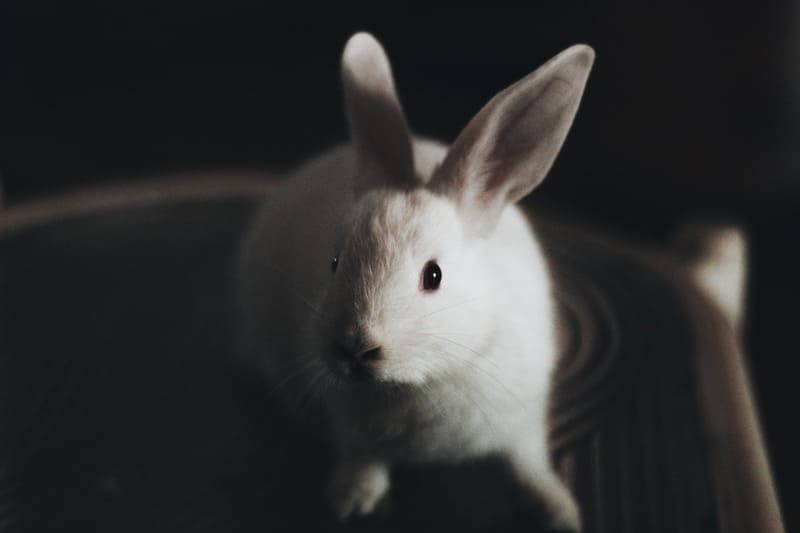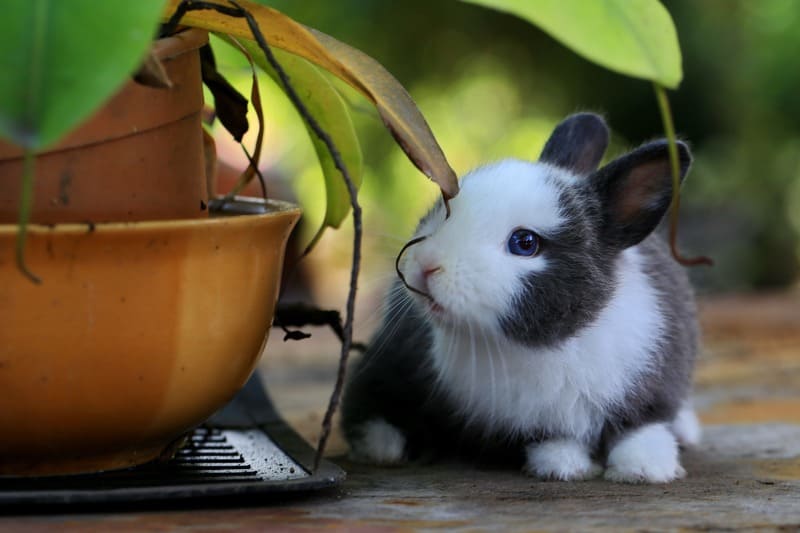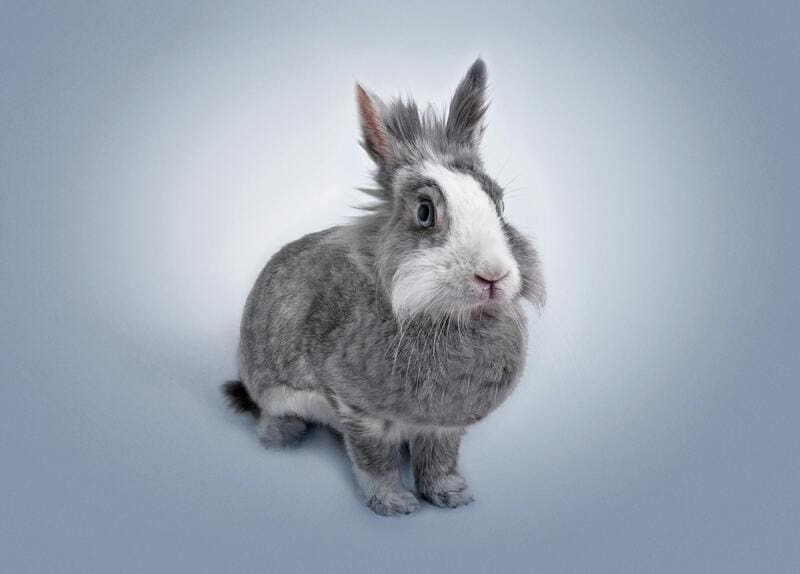Rabbits, often associated with their fluffy ears and twitching noses, have captured the hearts of many as endearing and charming pets. While they may seem small and unassuming, rabbit owners know that these animals can exhibit distinct personalities and behaviors. In this extensive exploration, we will delve into the intriguing world of rabbit personalities, shedding light on their individuality, behavior traits, and what makes each bunny unique.

Understanding Rabbit Behavior
To comprehend the concept of distinct rabbit personalities, it’s crucial to first have a solid understanding of rabbit behavior. While rabbits share certain behaviors as a species, individual personalities can be influenced by a variety of factors.
Instinctual Behaviors
Rabbits, like all animals, have instinctual behaviors that are deeply ingrained. These behaviors are essential for their survival and well-being in the wild. Some instinctual behaviors in rabbits include:
- Thumping: Rabbits will thump their hind legs on the ground to alert others in their warren of potential danger. This behavior is still present in domestic rabbits and can be triggered by loud noises or sudden movements.
- Grooming: Grooming is a vital instinctual behavior for rabbits. It helps them keep clean, maintain their fur, and bond with their companions. They are meticulous groomers and will often groom their human caregivers as a sign of affection.
- Digging: Rabbits are natural diggers and will often try to burrow or dig in their environment. This behavior is related to their burrowing instincts in the wild and can be observed as rabbits scratch and dig at the ground.
- Chewing: Rabbits have continuously growing teeth, and chewing is essential for keeping their teeth at a manageable length. It’s also a way for them to explore their environment and manipulate objects.
Social Behaviors
Rabbits are social animals that have developed complex social behaviors to interact with one another. These social behaviors can also be directed towards their human caregivers. Some social behaviors in rabbits include:
- Bonding: Rabbits have a strong desire to bond with other rabbits or humans. They form strong attachments and can experience loneliness and depression when kept in isolation.
- Thumping and Nudging: Rabbits may nudge or bump their human caregivers to seek attention or express affection. They might also nudge other rabbits to initiate social interactions.
- Licking: Licking is a common social behavior among bonded rabbits. They often groom each other as a way of bonding and showing affection.
- Purring: Some rabbits will emit a soft purring sound, often associated with contentment or relaxation. Not all rabbits purr, but those that do may do so when being petted or cuddled.
Fear and Defensive Behaviors
Rabbits can exhibit various behaviors when they feel threatened or afraid. These behaviors are designed to help them escape or protect themselves. Some fear and defensive behaviors in rabbits include:
- Freezing: When a rabbit is scared, it may freeze in place, hoping to avoid detection by a potential predator.
- Fleeing: If a rabbit feels threatened, its instinct is to run away and find a place to hide. Domestic rabbits may exhibit this behavior if they are frightened.
- Aggression: When cornered or feeling extremely threatened, a rabbit may resort to aggression as a last line of defense. This can include growling, biting, or striking with their front paws.
- Hiding: Hiding is a common behavior in rabbits when they feel frightened. In their natural environment, they would find a safe burrow or warren to hide in. In a domestic setting, they may hide in their enclosure or a quiet, dark space.
These instinctual, social, and defensive behaviors provide the foundation for understanding rabbit behavior. However, it’s essential to recognize that individual personalities can manifest through variations in these behaviors.

Factors Influencing Rabbit Personalities
Rabbit personalities are shaped by a combination of genetic, environmental, and social factors. Understanding these influences can help rabbit owners appreciate the unique qualities of their furry companions.
Genetics
Genetic factors play a significant role in determining a rabbit’s personality. Just as humans inherit certain personality traits from their parents, rabbits inherit genetic predispositions that can influence their behavior. While specific genes associated with rabbit personality traits have not been extensively studied, it’s well-accepted that genetics contribute to a rabbit’s disposition and temperament.
For example, some rabbits may inherit a more anxious disposition, while others might have a more laid-back temperament. These genetic predispositions can manifest as differences in how rabbits respond to various situations and stimuli.
Early Life Experiences
Early life experiences have a profound impact on a rabbit’s personality. How a rabbit is raised, socialized, and cared for during its early days can shape its behavior throughout its life. Factors such as:
- Handling: The way a rabbit is handled and interacted with during its early weeks and months can influence its level of comfort with human contact and handling.
- Socialization: Exposure to different people, animals, and environments during early development can lead to a more well-adjusted and social rabbit.
- Positive or Negative Experiences: Positive early experiences can foster trust and confidence, while negative experiences can result in fear or anxiety.
- Environmental Enrichment: Providing mental and physical stimulation in the rabbit’s early environment can contribute to curiosity and adaptability.
Social Interactions
The presence of other rabbits or animals in a rabbit’s environment can also influence its personality. Rabbits are social creatures, and their interactions with other rabbits can shape their behavior. For example:
- Bonding with Other Rabbits: Rabbits that have positive relationships with other rabbits tend to be more social and engaged. Bonded pairs or groups often exhibit specific behaviors related to their social structure.
- Solitary Rabbits: Rabbits that live in isolation may have distinct personalities shaped by their need for companionship or their self-reliance.
- Interactions with Other Animals: The presence of other animals, such as dogs or cats, can influence a rabbit’s level of alertness and comfort.
Care and Handling
How a rabbit is cared for and handled on a day-to-day basis can greatly affect its personality. Factors related to care and handling that can shape a rabbit’s personality include:
- Feeding and Nutrition: Proper nutrition is crucial for a rabbit’s overall well-being, and inadequate nutrition can lead to health issues that affect behavior.
- Healthcare: Regular veterinary care and health management can prevent or address physical discomfort that might affect a rabbit’s behavior.
- Interaction and Attention: The amount of interaction, attention, and mental stimulation a rabbit receives from its caregivers can significantly impact its personality.
- Training and Socialization: Positive reinforcement training and socialization practices can foster desirable behaviors and a well-rounded personality.
- Environment: The physical environment in which a rabbit lives, including the size and layout of its enclosure, the presence of toys and hiding places, and access to natural light, can all influence its behavior and demeanor.
Owner’s Behavior
The behavior and interactions of the rabbit’s owner or caregiver also play a role in shaping the rabbit’s personality. For example:
- Consistency: A rabbit’s personality can be influenced by consistent and predictable handling and care routines provided by its owner.
- Respect and Trust: The level of respect and trust between the owner and the rabbit can impact the rabbit’s comfort and behavior.
- Understanding Rabbit Language: An owner’s ability to understand and respond to a rabbit’s body language and vocalizations can contribute to a more harmonious relationship.
- Positive Reinforcement: Using positive reinforcement techniques when training and interacting with a rabbit can encourage desired behaviors and a trusting personality.
Age
Rabbit personalities can also evolve and change as they age. For example, a young rabbit may be more energetic and prone to playful behaviors, while an older rabbit may become more sedate and less active. Understanding and accommodating these age-related changes is essential for providing the best care.
The interplay of these genetic, environmental, and social factors results in the unique personalities that make each rabbit an individual.

Recognizing Rabbit Personalities
Rabbit owners often describe their pets with various personality traits and characteristics. While every rabbit is unique, there are some common personality traits and behaviors that can be recognized in rabbits.
Outgoing and Sociable
Some rabbits are naturally outgoing and sociable. They may readily approach humans, enjoy being petted, and actively seek out interactions. These rabbits are often described as friendly, affectionate, and curious. They may be more inclined to explore their environment and interact with other pets in the household.
Shy and Reserved
On the other end of the spectrum are rabbits that are shy and reserved. These rabbits may take more time to warm up to humans and new experiences. They may be cautious and prefer to observe their surroundings from a safe distance. With patience and gentle socialization, shy rabbits can become more comfortable over time.
Playful and Energetic
Some rabbits exhibit playful and energetic personalities. They enjoy activities like hopping, running, and playing with toys. Playful rabbits may be more likely to engage in interactive games with their owners and show a high level of enthusiasm during playtime.
Calm and Laid-Back
Other rabbits have calm and laid-back personalities. They are often content to relax and lounge around, taking life at a leisurely pace. These rabbits may be less excitable and more relaxed in their interactions.
Independent and Self-Reliant
Certain rabbits exhibit independent and self-reliant personalities. They may be comfortable spending time alone and may not require constant attention from their owners. While they may enjoy social interactions, they are also content to entertain themselves.
Vocal and Communicative
A few rabbits are particularly vocal and communicative. They may use a range of vocalizations, such as purring, chirping, or even growling, to express their feelings and desires. These rabbits are adept at conveying their emotions and intentions through their sounds.
Affectionate and Cuddly
Some rabbits are especially affectionate and cuddly. They may seek out physical contact and enjoy being held, cuddled, or petted. These rabbits often form strong bonds with their owners and are known for their loving behavior.
Territorial and Protective
A small number of rabbits can exhibit territorial and protective behaviors. They may be particularly vigilant about defending their space and may display defensive behaviors when other animals or humans approach. These rabbits require careful socialization and management.
Recognizing and understanding your rabbit’s personality can deepen the bond between you and your pet and lead to a more fulfilling and enjoyable relationship.
Nurturing Your Rabbit’s Personality
Regardless of the personality your rabbit exhibits, there are several ways to nurture and support their individuality. Here are some key considerations:
Socialization
Socialization is crucial for rabbits to develop well-rounded and positive personalities. Regular, gentle, and positive interactions with humans and, if possible, other rabbits, can help a rabbit feel comfortable and secure. Socialization can prevent shyness or fearfulness and encourage outgoing and friendly behaviors.
Training
Training your rabbit can be an enjoyable and rewarding way to encourage positive behaviors and strengthen your bond. Positive reinforcement techniques, such as clicker training and using treats, can be used to teach your rabbit commands and tricks, as well as reinforce desired behaviors.
Enrichment
Enrichment activities are essential for all rabbits, regardless of their personalities. Providing mental and physical stimulation, such as toys, tunnels, puzzles, and opportunities for exploration, can prevent boredom and help channel your rabbit’s energy and curiosity.
Health Care
Regular veterinary care is crucial to ensure that your rabbit’s physical health is maintained. Physical discomfort or illness can lead to changes in behavior. Routine check-ups, vaccinations, and dental care are essential for keeping your rabbit in good health.
Diet and Nutrition
Proper nutrition is a fundamental aspect of maintaining a healthy rabbit with a well-balanced personality. Providing a diet rich in hay, fresh vegetables, and high-quality rabbit pellets is essential. Avoid feeding excessive sugary or starchy treats, as these can impact behavior and health.
Understanding Body Language
Understanding your rabbit’s body language and vocalizations is a key aspect of nurturing their personality. Being attuned to their cues and responses can help you respond appropriately and strengthen your communication.
Providing a Safe and Comfortable Environment
Creating a safe and comfortable living environment is essential for your rabbit’s well-being and personality. Ensure that their enclosure is appropriately sized, secure, clean, and filled with hiding spots and comfort items.
Conclusion
In conclusion, the question of whether rabbits actually have distinct personalities is one that has intrigued researchers, pet owners, and animal enthusiasts alike. Through a growing body of scientific evidence and countless anecdotal observations, it is becoming increasingly clear that rabbits do indeed possess distinct personalities. These personalities are shaped by a combination of genetic factors and environmental influences, much like in other animals, including humans.
While some may argue that rabbits are stereotypically seen as timid and passive creatures, the reality is that they exhibit a wide range of individual traits, behaviors, and preferences. Some rabbits are naturally more outgoing and adventurous, while others are more reserved and cautious. Factors such as breed, early socialization, and the quality of human interaction can all contribute to the development of a rabbit’s unique personality.
Recognizing and respecting the distinct personalities of rabbits is crucial for their well-being, whether they are kept as pets or in a more natural environment. Understanding their individual needs and preferences can lead to healthier, happier rabbits and stronger human-animal bonds.
In the end, while it may take some time and careful observation to fully appreciate the nuances of a rabbit’s personality, there is no doubt that these small, seemingly unassuming creatures are capable of forming strong connections with their human companions and bringing joy to our lives in their own unique ways. As our understanding of animal behavior continues to evolve, it is likely that we will uncover even more about the rich and diverse personalities that exist within the world of rabbits.
